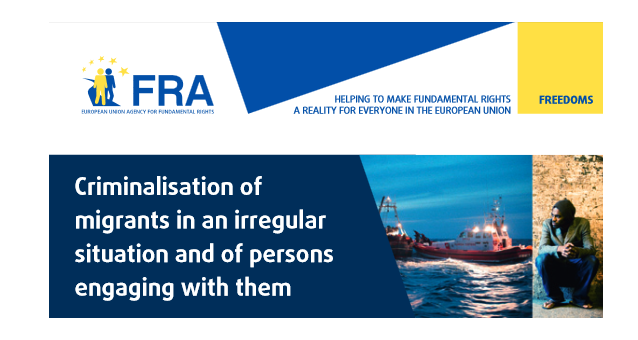European Union Agency for Fundamental Rights Paper on criminalisation of irregular migrants

[Brussels, 27 March 2014] A new paper by the European Union Agency for Fundamental Rights (FRA) examines measures in EU Member States to counter irregular migration and their compatibility with fundamental rights. The paper is part of FRA’s ongoing work in the area of asylum and migration, and is also a contribution to the current discussions about modifying EU legislation on assisting unauthorised entry. This is an important aspect of the European Commission’s ’Task Force Mediterranean’, which was set up following the deaths of almost 400 people off the Italian island of Lampedusa in October 2013.
The Criminalisation of irregular migrants paper begins by discussing the punishments administered by Member States for irregular entry or residence. The majority of Member States punish irregular entry and stay with imprisonment and/or a fine. This risks migrants being imprisoned beyond the pre-removal detention that is allowed by the Return Directive, which sets out standards and procedures for returning irregular migrants.
Because of a real or perceived danger of detection, migrants in an irregular situation are often too afraid to use medical facilities, send their children to school, register their children’s births or attend religious services. If the state encourages the general public to report migrants in an irregular situation to the immigration authorities, this will drive migrants further underground, depriving them of access to public services and making them more vulnerable to exploitation and abuse.
Criminalisation harms not only the migrants themselves, but also those who support them, such as providers of humanitarian or legal assistance, or people who rescue migrants in distress at sea. For example, fishermen fear punishment for rescuing migrants at sea, a fact that was widely reported following the Lampedusa tragedy. In addition, landlords may be punished for renting accommodation to irregular migrants.
FRA’s findings are described in the context of the Return Directive, as well as the Facilitation Directive and accompanying regulations that oblige EU Member States to punish anyone who assists a person to enter, pass through or remain on EU territory in an irregular manner.
The Paper contains several recommendations that aim to ensure the treatment of irregular migrants entering and living in the EU is in line with the Union’s fundamental rights standards. For example:
*
EU Member States should treat migrants in an irregular situation according to the safeguards contained in the Return Directive. As long as the Return Directive applies to them, they should not be subject to imprisonment for irregular entry or stay.
*
To promote access to justice, migrants who have become victims of exploitation and abuse need to have a residence permit that is not dependent on the perpetrator. This is particularly important for victims of gender-based violence.
*
Anyone giving humanitarian assistance such as rescue at sea or providing humanitarian services such as food, shelter, medical care or legal advice to migrants in an irregular situation should not have to risk punishment for facilitating irregular entry or stay. In addition, renting accommodation to irregular migrants without the intention of preventing the migrant’s removal should not be considered facilitation of stay.
Related publications
![]() Fundamental rights at Europe’s southern sea borders (2013)
Fundamental rights at Europe’s southern sea borders (2013)
![]() Fundamental rights of migrants in an irregular situation in the European Union (2011)
Fundamental rights of migrants in an irregular situation in the European Union (2011)
![]() Detention of third country nationals in return procedures (2010)
Detention of third country nationals in return procedures (2010)
Related projects
Severe forms of labour exploitation




